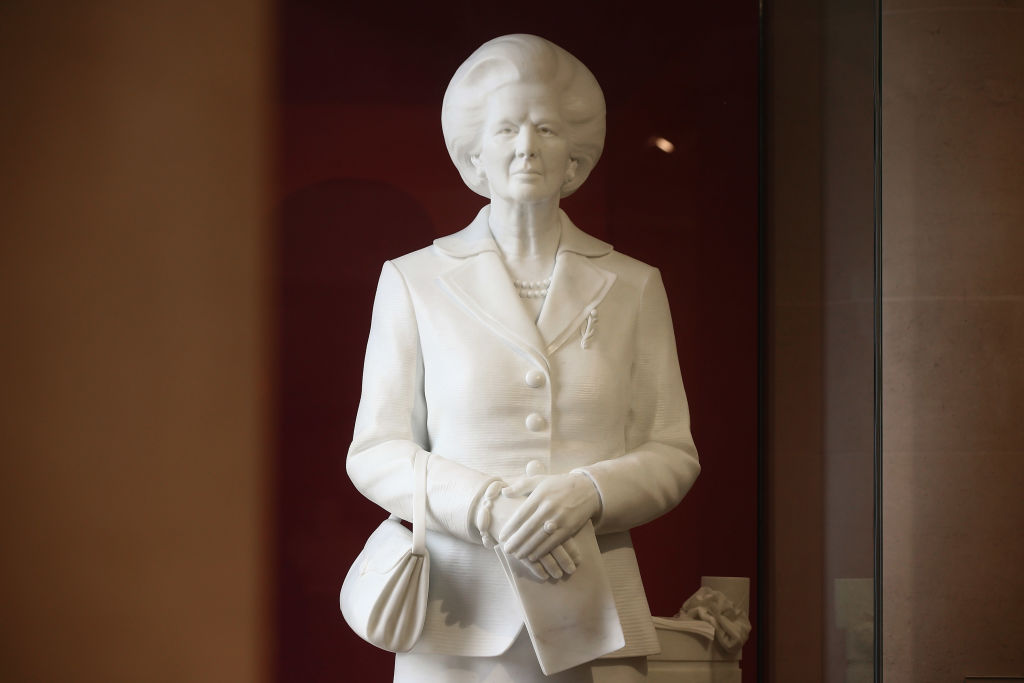Grantham in Lincolnshire has an interesting history. Newton went to school there. Turner produced several paintings of local scenes. During the last war, the town, set in flat countryside ideal for airfields, made a significant contribution to the bombing of Nazi Germany. In private, the most famous person ever to be born in the town might well have said: ‘jolly good thing too.’ Margaret Thatcher never found it easy to forgive what happened during the war.
A lot of people still do not find it easy to forgive her. Some locals are now complaining about a proposal to add laurels to their town by erecting a statue to this greatest of Granthamites. Apart from concluding that these critics are wrong, it is worth looking behind their list of supposed grievances.
Although it is true that some old-fashioned industries perished during her premiership, she cannot be blamed for globalisation, growing concerns about the environment – especially as regards coal – and the destructive effect of militant trade unionism over several decades. Unlike some of her predecessors, she insisted on tackling those problems, and succeeded.
But the antagonism towards her goes deeper than the fate of specific industries. As her detractors see it, she did not only destroy jobs. She destroyed dreams. Back in 1979, a large section of the British population, including many gloomy Tories, had come to think that the leftward drift was unstoppable. There were moderate socialists, who believed that year on year, the state should own a greater proportion of the nation’s wealth, spend an increasing percentage of its income and regulate more and more of its activities. There were more radical socialists, the Bennite precursors of Jeremy Corbyn, who regarded that Fabian approach as far too timid. They wanted full-blooded socialism within one parliament. Moderates and radicals alike, there was little difference as far as Margaret Thatcher was concerned. She set out to stop them all. She won.
Within a few years, these ‘isms’ had become ‘wasms’ The aspirations of the 1970s left were now consigned to political archaeology. The middle classes are the bedrock of every society. She led their counter-attack. She revived their animal spirits. Thatcher’s enemies wanted to reshape society. She did reshape society, and they will never forgive her.
There is a further point. Some of those who dislike Thatcher find middle-class patriotism aesthetically repellent. She was a patriot through and through, and gloried in her country’s greatness, rather as Churchill did. It is worth noting that Churchill’s statue is a frequent target when protesters march through Whitehall. It seems inevitable that Thatcher’s statue will, too, end up being attacked. But this is not an argument against honouring the Iron Lady.
There is a further case for a statue honouring Margaret Thatcher, which would not apply to Churchill: her contribution to feminism. That might seem paradoxical. She only and briefly promoted one other woman to her Cabinet. She would never have entertained any notion of positive discrimination or quotas. But she believed that able, ambitious and hard-working women would be able to push open any doors and smash through any ceilings. A generation of younger women learned from her example.
So did older men. Back in 1975, throughout the City, men were in charge. Many of them were genially prejudiced against the employment of females. Such attitudes have thankfully been banished to archaeology, and Margaret Thatcher helped. Within a few months of her becoming Tory leader, it was precisely those sort of characters who were saying: ‘Maggie’s the best man we’ve got.’ Thatcher taught such men to rethink their views of women.
She is and will remain a controversial figure; she would not have wished any other destiny. As long as Britain survives and our history is studied, Margaret Thatcher will be the subject of debate and argument. There, statues will help. Children yet unborn will be able to ask their parents who that was, and hear a fascinating story.
So of course there should be a statue in the town of her birthplace. In honouring her, Grantham would honour itself. She also deserves a statue in Parliament Square, near Churchill’s. Perhaps their mighty ghosts would commune. He in war, she in peace: two paladins of Britishness, two towering figures who devoted their lives to the service – and the saving – of their country. Statues are the least that their memory deserves.






Comments